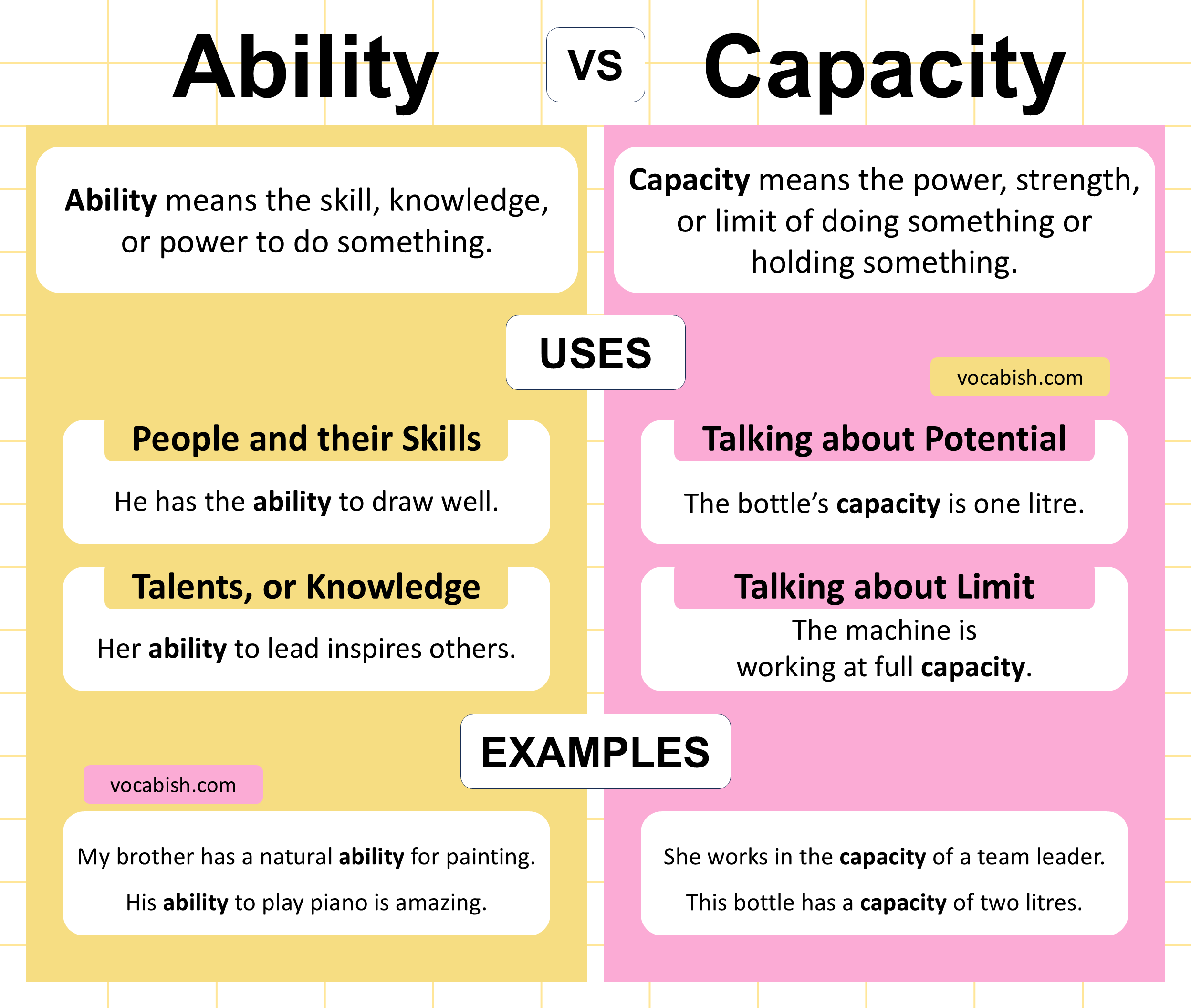Many English learners confuse Ability and Capacity because they seem similar but have different meanings. Understanding the difference is important for correct writing and speaking, and it also helps improve reading and listening skills. In this blog post, you will learn when and how to use Ability and Capacity, with examples that show their meanings and practical uses in everyday English.
You can explore our 100 confusing words list to expand your vocabulary skills!
What is the Difference Between Ability and Capacity?
Both ability and capacity show power to do something, but they are used in different contexts.
- Ability usually means skill or talent.
- Capacity means the potential or power to do something, often with limits.
Let’s understand both words in detail.
Meaning of Ability
Ability means the skill, knowledge, or power to do something. It tells what a person can do now because of their learning or practice.
Examples:
- She has the ability → to speak three languages.
- The team showed great ability → during the match.
- His ability → to solve problems is impressive.
| Word | Part of Speech | Meaning | Example |
|---|---|---|---|
| Ability | Noun | Skill or talent to do something | She has the ability to teach well. |
Meaning of Capacity
Capacity means the power, strength, or limit of doing something or holding something. It is often used for potential, limit, or position.
Examples:
- The hall has a capacity → of 500 people.
- He has the capacity → to become a great leader.
- The tank’s capacity → is 100 litres.
| Word | Part of Speech | Meaning | Example |
|---|---|---|---|
| Capacity | Noun | Potential, limit, or power to do or hold something | The bus has a capacity of 40 passengers. |
Differences Between Ability and Capacity
| Point of Difference | Ability | Capacity |
|---|---|---|
| Meaning | Skill or talent to do something | Power or potential to do or hold something |
| Focus | What a person can do now | What a person or thing can possibly do |
| Used For | People and their skills | People, machines, or things |
| Example | She has the ability to dance beautifully. | The tank has the capacity to hold 500 litres of water. |
Usage of Ability
Use ability when talking about someone’s skills, talents, or knowledge.
Examples:
- He has the ability → to draw well.
- The student’s ability → in maths is outstanding.
- Her ability → to lead inspires others.
- You should improve your ability → to write clearly.
Usage of Capacity
Use capacity when talking about potential, limit, or official role.
Examples:
- The bottle’s capacity → is one litre.
- He worked in the capacity → of a manager.
- Our school has the capacity → to teach 800 students.
- The machine is working at full capacity.
Formal and Informal Uses of Ability and Capacity
| Word | Formal Use | Informal Use |
|---|---|---|
| Ability | Often used in reports, essays, and workplace communication. | Used in daily speech to describe skill or talent. |
| Capacity | Common in formal writing for job titles, systems, and measurements. | Sometimes used casually to describe power or limit. |
Example Sentences with Ability
- She has the ability → to understand complex problems.
- My brother has a natural ability → for painting.
- His ability → to play piano is amazing.
- The company values employees with strong abilities.
- You can improve your ability → through practice.
Example Sentences with Capacity
- The hall’s capacity → is 1,000 people.
- The dam has the capacity → to store a large amount of water.
- She works in the capacity → of a team leader.
- This bottle has a capacity → of two litres.
- He has the capacity → to become a successful businessman.
FAQs on Capacity vs Ability
What does ability mean in simple words?
Ability means the skill or power to do something well.
What does capacity mean in simple words?
Capacity means the power or potential to do something or the limit something can hold.
Can ability and capacity be used interchangeably?
Not always. Ability is used for skills, while capacity is used for potential or limits.
Is ability related to talent?
Yes. Ability often shows a person’s talent or skill in a certain area.
When to use ability vs capacity?
Use ability when talking about skills or talents and capacity when referring to potential, limits, or roles.
Read More

